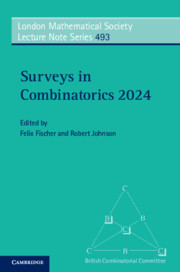Book contents
- Frontmatter
- Contents
- Preface
- Intersection Theory of Matroids: Variations on a Theme
- Erdős Covering Systems
- The Cluster Expansion in Combinatorics
- Sublinear Expanders and Their Applications
- Transversals in Latin Squares
- Finite Field Models in Arithmetic Combinatorics – Twenty Years On
- The Slice Rank Polynomial Method – A Survey a Few Years Later
- An Introduction to Transshipments Over Time
- Oriented Trees and Paths in Digraphs
- References
Intersection Theory of Matroids: Variations on a Theme
Published online by Cambridge University Press: 23 May 2024
- Frontmatter
- Contents
- Preface
- Intersection Theory of Matroids: Variations on a Theme
- Erdős Covering Systems
- The Cluster Expansion in Combinatorics
- Sublinear Expanders and Their Applications
- Transversals in Latin Squares
- Finite Field Models in Arithmetic Combinatorics – Twenty Years On
- The Slice Rank Polynomial Method – A Survey a Few Years Later
- An Introduction to Transshipments Over Time
- Oriented Trees and Paths in Digraphs
- References
Summary
Chow rings of toric varieties, which originate in intersection theory, feature a rich combinatorial structure of independent interest. We survey four different ways of computing in these rings, due to Billera, Brion, Fulton–Sturmfels, and Allermann–Rau. We illustrate the beauty and power of these methods by giving four proofs of Huh and Huh–Katz’s formula μk(Μ) = degΜ(αr–k βk) for the coefficients of the reduced characteristic polynomial of a matroid M as the mixed intersection numbers of the hyperplane and reciprocal hyperplane classes α and β in the Chow ring of Μ. Each of these proofs sheds light on a different aspect of matroid combinatorics, and provides a framework for further developments in the intersection theory of matroids.
Our presentation is combinatorial, and does not assume previous knowledge of toric varieties, Chow rings, or intersection theory. This survey was prepared for the Clay Lecture to be delivered at the 2024 British Combinatorics Conference.
- Type
- Chapter
- Information
- Surveys in Combinatorics 2024 , pp. 1 - 30Publisher: Cambridge University PressPrint publication year: 2024

